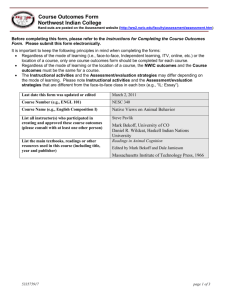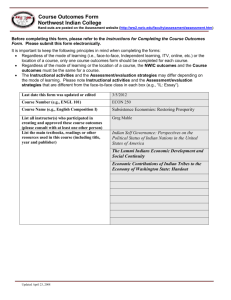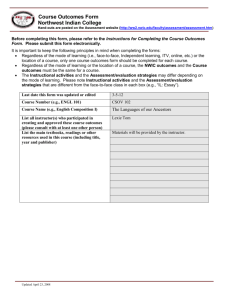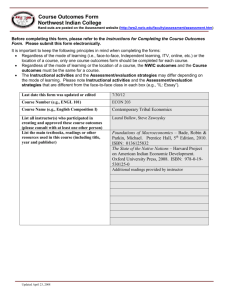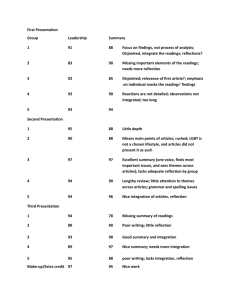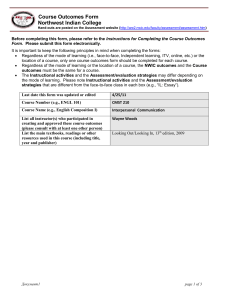Readings, class discussions, and weekly reflection papers.
advertisement
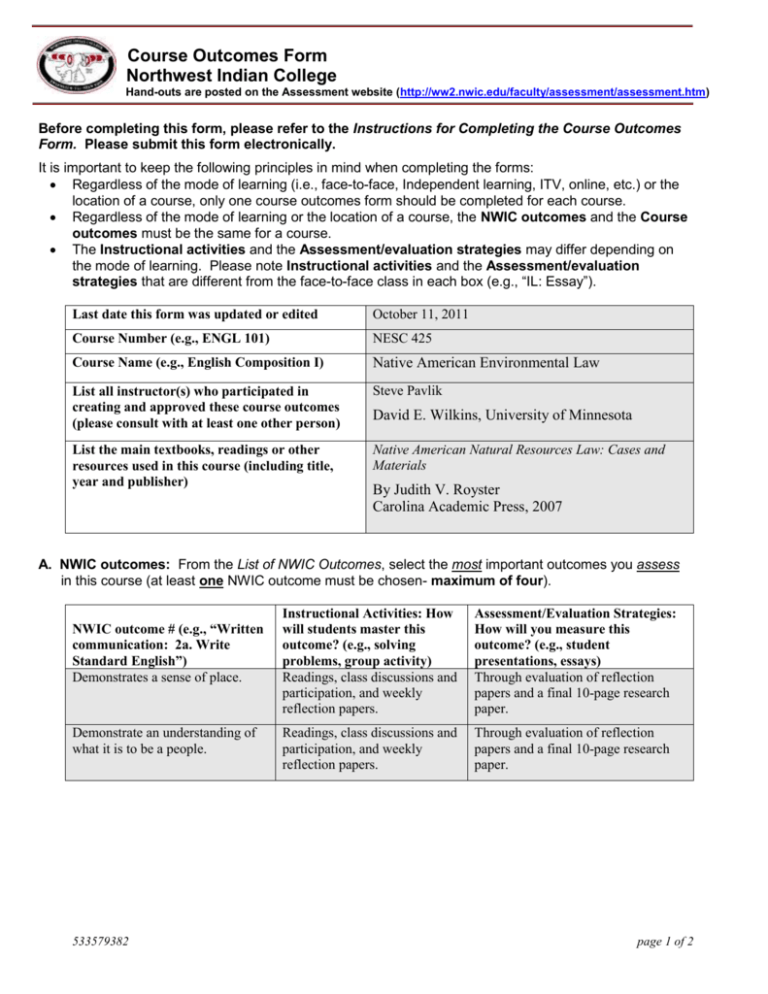
Course Outcomes Form Northwest Indian College Hand-outs are posted on the Assessment website (http://ww2.nwic.edu/faculty/assessment/assessment.htm) Before completing this form, please refer to the Instructions for Completing the Course Outcomes Form. Please submit this form electronically. It is important to keep the following principles in mind when completing the forms: Regardless of the mode of learning (i.e., face-to-face, Independent learning, ITV, online, etc.) or the location of a course, only one course outcomes form should be completed for each course. Regardless of the mode of learning or the location of a course, the NWIC outcomes and the Course outcomes must be the same for a course. The Instructional activities and the Assessment/evaluation strategies may differ depending on the mode of learning. Please note Instructional activities and the Assessment/evaluation strategies that are different from the face-to-face class in each box (e.g., “IL: Essay”). Last date this form was updated or edited October 11, 2011 Course Number (e.g., ENGL 101) NESC 425 Course Name (e.g., English Composition I) Native American Environmental Law List all instructor(s) who participated in creating and approved these course outcomes (please consult with at least one other person) Steve Pavlik List the main textbooks, readings or other resources used in this course (including title, year and publisher) Native American Natural Resources Law: Cases and Materials David E. Wilkins, University of Minnesota By Judith V. Royster Carolina Academic Press, 2007 A. NWIC outcomes: From the List of NWIC Outcomes, select the most important outcomes you assess in this course (at least one NWIC outcome must be chosen- maximum of four). NWIC outcome # (e.g., “Written communication: 2a. Write Standard English”) Demonstrates a sense of place. Demonstrate an understanding of what it is to be a people. 533579382 Instructional Activities: How will students master this outcome? (e.g., solving problems, group activity) Readings, class discussions and participation, and weekly reflection papers. Assessment/Evaluation Strategies: How will you measure this outcome? (e.g., student presentations, essays) Through evaluation of reflection papers and a final 10-page research paper. Readings, class discussions and participation, and weekly reflection papers. Through evaluation of reflection papers and a final 10-page research paper. page 1 of 2 B. Course outcomes: In order of priority, list the most important other learning outcomes for this course that you assess (a maximum of 10). Other course outcomes: Complete the sentence – As a result of this course, students will be able to… Examine the nature of the “social contract” and how it has impacted upon legal decisions regarding tribal management of land, water, and natural resources. Analyze the major court decisions that have upheld the reserved rights doctrine as it applies to hunting and fishing, and other natural resource uses; and explore its application to broadening existing tribal management of land, water, and natural resources. Critique the federal trust doctrine as it applies to the management and use of tribal land, water, and natural resources. Interpret key pieces of federal legislation, such as the National Environmental Protection Act (NEPA), Endangered Species Act (ESA) and MagnussonStevens Act, and determine their impacts upon tribal land use and resource management. Evaluate the historical origins and implications of the American Indian Religious Freedoms Act (AIRFA), and other legislation, as these laws apply to the access, use, and protection of sacred lands, and traditional and customary use areas. Instructional Activities: How will students master this outcome? (e.g., solving problems, group activity) Readings, class discussions, and weekly reflection papers. Assessment / Evaluation Strategies: How will you measure this outcome? (e.g., student presentations, essays) Through evaluation of reflection papers and a final 10-page research paper. Readings, class discussions, and Through evaluation of reflection weekly reflection papers. papers and a final 10-page research paper. Readings, class discussions, and Through evaluation of reflection weekly reflection papers. papers and a final 10-page research paper. Readings, class discussions, and Through evaluation of reflection weekly reflection papers. papers and a final 10-page research paper. Readings, class discussions, and Through evaluation of reflection weekly reflection papers. papers and a final 10-page research paper. C. Please list the NWIC outcomes and course outcomes from above on your syllabus. D. Please assess the NWIC outcomes and course outcomes, which are listed above, in your classes. 533579382 page 2 of 2
